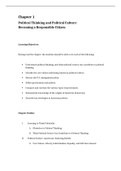Chapter 1
Political Thinking and Political Culture: Becoming a Responsible Citizen
Learning Objectives
Having read the chapter, the students should be able to do each of the following:
Understand political thinking, and what political science can contribute to political thinking.
Identify the core values underlying American political culture.
Discuss the U.S. immigration policy.
Define government and politics.
Compare and contrast the various types of government.
Demonstrate knowledge of the origins of American democracy.
Describe key ideologies in American politics.
Chapter Outline
I.Learning to Think Politically
A.Obstacles to Political Thinking
B.What Political Science Can Contribute to Political Thinking
II.Political Culture: Americans’ Enduring Beliefs
A.Core Values: Liberty, Individualism, Equality, and Self-Government B.The Limits and Power of Americans’ Ideals
III.Politics and Power in America
A.A Democratic System
B.A Constitutional System
C.A Free-Market System
D.Who Governs?
IV.The Text’s Organization
V.Summary
Focus and Main Points
Contemporary American government is placed in historical perspective in this chapter. The value of political science in examining the development of American politics since the country’s earliest years is examined briefly, and concepts such as power, pluralism, and constitutionalism that are central to the study of government and politics are also defined and discussed. In addition, the value of political thinking and the ability of political science to help develop political thinking are examined. Several comparisons between the cultural development of political institutions and financial systems of the United States and Europe help illustrate the different forms of government and economic organization. The main points of this chapter are as follows:
The development of political thinking is important for functioning democracies, which rely on the informed choices of citizens for the formation of government. There are powerful obstacles to political thinking, such as individual unwillingness to develop it, changing patterns of media consumption, and “spin” by political leaders. Political science is a discipline that can help develop political thinking among students and also lead to a fuller understanding of political phenomena.
Every country has its distinctive political culture, a widely shared and deep-seated belief system. National identity in many countries is taken from the common ancestry and kinship they share. Americans are linked not by a shared ancestry but by the country’s political culture as the foundation of its national identity. Politics is the process through which a society settles its conflicts . Those who win in political conflict are said to have power, and those leaders that have gained the legitimacy to use that power have authority. The play of politics in the United States takes place in the context of democratic procedures, constitutionalism, and the free-
market system. Theorists differ in explaining how power is wielded, using elements of majoritarianism, pluralism, corporate power, and elite rule as explanatory models.
Politics in the United States is characterized by a widespread sharing of power through a highly fragmented governing system with extensive checks and balances, a high degree of pluralism, and an extraordinary emphasis on individual rights.
Chapter Summary
Political thinking is the careful gathering and sifting of information in the process of forming
knowledgeable views of political developments. Political thinking is a key to responsible citizenship, but many citizens avoid it by virtue of paying scant attention to politics. The tools of political science can contribute to effective political thinking. The United States is a nation that was formed on a set of ideals. Liberty, individualism, equality, and self-government are foremost among these ideals. These ideals became Americans’ common bond and today are the basis of their political culture. Although imperfect in practice, these ideals have guided what generations of Americans have tried to achieve politically.
Politics is the process by which it is determined whose values will prevail in society. The basis of politics is conflict over scarce resources and competing values. Those who have power win out in this conflict and are able to control governing authority and policy choices. In the United States, no one faction controls all power and policy. Majorities govern on some issues, while other issues are dominated by groups, elites, corporations, individuals through legal action, or officials who hold public office. Politics in the United States plays out through rules of the game that include democracy, constitutionalism, and free markets. Democracy is rule by the people, which in practice refers to a representative system of government in which the people rule through their elected officials. Constitutionalism refers to rules that limit the rightful power of government over citizens. A free-market system assigns private parties the dominant role in
determining how economic costs and benefits are allocated.
Major Concepts
political thinking
The careful gathering and sifting of information in the process of forming a knowledgeable view about a political issue.
political science
The systematic study of government and politics.
political culture
The widely shared and deep-seated political beliefs of a particular people.
liberty
The principle that individuals should be free to act and think as they choose, provided
they do not infringe unreasonably on the freedom and well-being of others.
individualism
The idea that people should take the initiative, be self-sufficient, and accumulate the material advantages necessary for their well-being.
equality
The notion that individuals are equal in their moral worth and thereby entitled to equal treatment under the law.
self-government
The principle that the people are the ultimate source and proper beneficiary of governing authority; in practice, a government based on majority rule.
politics
The means by which a society settles its conflicts.





